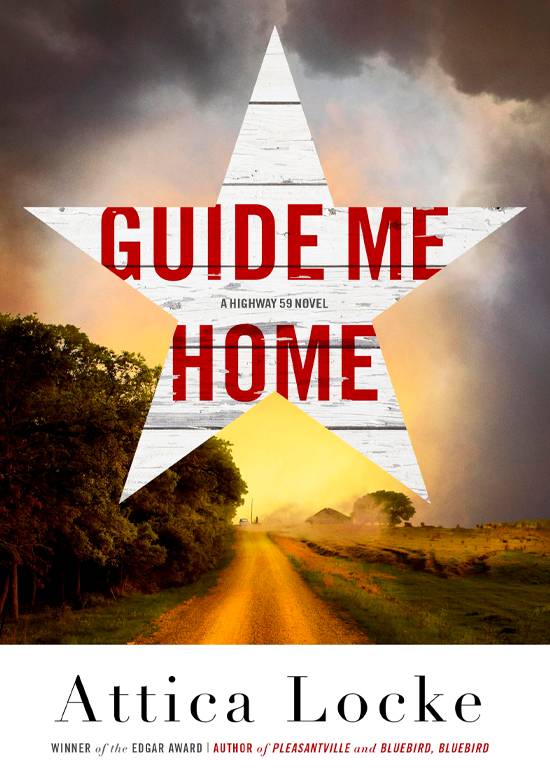
Guide Me Home
by Attica Locke
New York: Mulholland Books, 2024.
320 pp. $29.00 Hardcover
Reviewed by
Tucker Cowan
“Guide Me Home is a celebration and a critique by a writer who not only loves Texas but understands it intimately, its flora and fauna, its puzzling psychology down to the composition of its soil.”
Texas Ranger Darren Matthews returns in this third and final installment of Attica Locke’s massively popular and critically acclaimed Highway 59 trilogy, Guide Me Home. Here we find Matthews at his wit's end. He’s divorced, he’s drinking more than ever, and he’s facing an indictment by a grand jury for obstruction of justice charges. He’s so burned out that he decides to turn in his badge. Thus, Darren begins the novel an ex-Texas Ranger, resolved to spend his life tending to the heirloom tomatoes he grows from seeds passed down from his grandmother, and nurturing a budding relationship with Randie Winston, the widow to a murder victim he met in book one. His early retirement is quickly disturbed when his mother, a cleaning lady at a sorority house in Nacogdoches, tells him about a missing girl—the only black resident of the house. No one seems to care that she hasn’t been seen for days, not the other girls or even the school’s administration. Despite his precarious legal situation and having just surrendered his authority, Darren agrees to investigate the case.
Set in 2019, Guide Me Home takes place three years after the events of Heaven, My Home and three years into Trump’s first administration—an increasingly unbearable source of anxiety for Locke’s characters (and a boon to others). It’s one of Locke’s great strengths: her insistence on naming names. Each novel in the series takes on contemporary America and its political climate without resorting to stand-ins or obfuscations. This is Trump’s America and Greg Abbott is the governor of Texas. Darren’s burnout is not simply a result of alcoholism, a failed relationship, and work troubles—he’s experiencing the effects of a prolonged spiritual exhaustion that Locke has skillfully evoked over the course of the trilogy. The paradox of being a black law enforcement officer in a nation whose leadership empowers white supremacists has fueled Darren’s inner struggle since Bluebird, Bluebird, and things have gotten only worse. What can the concept of justice possibly mean for someone like him when the laws he’s tasked with protecting are often in direct conflict with his moral code? This contemporary expression of double consciousness situates Locke as the most recent and vital member of a cohort of American crime fiction writers that probably begins with Chester Himes and his Harlem Detective cycle. In A Rage in Harlem and The Real Cool Killers, Himes pushed the portrayal of racial violence and police corruption to absurd, cartoonishly extreme (and wildly entertaining, if that’s even the right word) levels. Locke’s style is more sober than Himes’s, although in Guide Me Home she expands her vision to include what approaches Himesian hyperbole, and even elements of Black horror.
Subtly evoking Jordan Peele’s Get Out, Darren’s investigation into the missing girl leads him to a housing development designed by a shady corporation that exploits its employees by providing homes while paying them below minimum wages. The company provides houses, computers, cell phones, and healthcare to employees—many of whom are people of color—who could otherwise not afford such luxuries, while preventing them from making enough money to save, essentially trapping them within a system of modern-day sharecropping. Darren senses there might be a connection between the corporation and the girl’s disappearance, but the girl’s family is too terrified to talk about their missing daughter or accept that the corporation might be complicit. They’re also outspoken Trump supporters, a fact that unnerves Darren who cannot understand how a Black family could vote against what he perceives to be their own interests. When he eventually confronts the icy head of the company, she defends her model of a new America where everyone can live in a home and possess modern conveniences as long as they serve their private-sector beneficiary as an employee. In other words, a nightmare hybrid of unfettered capitalism and white liberal good intentions, evoking Peele’s prescient deconstruction of the Obama-era’s veneer of a post-racial America.
It would be reductive to call the novel a left-wing screed. It’s a thrilling and well-written page turner (the most well-paced of the trilogy), and Locke’s love of Texas, its landscape, its particularly robust sense of identity and pride, shines through in evocative passages of lyrical prose perhaps only matched by that other Gulf state crime master, James Lee Burke. The power in these passages lies in Locke’s struggle to reconcile the state’s beauty and sense of community with its increasingly unjust policies and leadership. She portrays a place whose heart is forever at war with itself, with Darren Matthews as the embodiment of this struggle. Guide Me Home is a celebration and a critique by a writer who not only loves Texas but understands it intimately, its flora and fauna, its puzzling psychology down to the composition of its soil. One only hopes that between battling his demons and fighting the corrupt forces threatening to destroy all the good left in Texas, Darren can still find time to tend to his tomatoes.
Tucker Cowan holds a degree in Creative Producing for Film & TV from Chapman University. He worked in the film industry before earning an MFA in Creative Writing from Texas State University in 2024. He currently serves as a lecturer in the university’s English department.
